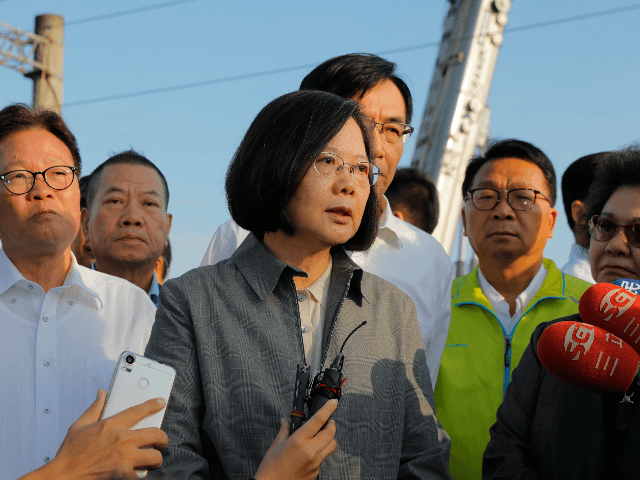Taiwanese President Tsai Ing-wen on Tuesday urged Hong Kong officials to listen to the protest movement and deal with its concerns instead of using force to suppress the movement, a course Tsai feared would lead to more violence.
“I worry that there might be a worse confrontation ahead if people’s demands remain unaddressed,” Tsai said in response to a question from reporters about protesters storming the Legislative Council (LegCo) building in Hong Kong on Monday and vandalizing it.
Tsai noted Taiwan is watching the events in Hong Kong closely, mindful of Communist China’s desire to force Taiwan into a similar “one country, two systems” relationship. The Taiwanese have long been concerned about the deterioration of autonomy and individual rights in Hong Kong, seeing it as a harbinger of Taiwan’s fate should it accept a similar arrangement with Beijing.
“It’s clear the Chinese Communist Party regime’s ‘one country, two systems’ is nothing but a lie. I urge the global community to support the people’s struggle for freedom and fully democratic elections,” said another Taiwanese official, Minister of Foreign Affairs Joseph Wu.
Writing at the Hill on Tuesday, Taiwan and China expert Joseph Bosco postulated the unrest in Hong Kong may have grown severe enough to give Beijing second thoughts about demanding “one country, two systems” for Taiwan, as it could prove even more difficult for the Communist Party to dominate.
Bosco saw the Hong Kong protests as a stiff challenge to the “conventional wisdom” that mainland China has no choice but to capture and absorb Taiwan, no matter how long it takes, even at the risk of a military confrontation with the United States. Bosco said:
Something about the conventional wisdom always seemed a bit hollow. Anecdotally, conversations with young Chinese, in China and the United States, evidenced no particular interest in the Taiwan question, and now a recent poll with a professional sampling confirms that general indifference: “[O]nly 22 percent of respondents selected … reunification with Taiwan … as among their top five issues.” If Taiwan ever truly was a core interest for the Chinese people, it is a core that clearly is melting away.
China’s leaders need to make a fundamental reassessment of their Taiwan and Hong Kong policies and determine whether it is in their long-term interest to continue their futile efforts to disturb the status quo and stifle the democratic aspirations of populations that have tasted freedom’s benefits.
Renouncing the use of force against Taiwan and of political interference in Hong Kong would accept the reality that Chinese societies are as capable as any other people to conduct their own affairs — as [former Chinese leader] Deng himself said about Hong Kong when he announced “one country, two systems.”
The Associated Press on Monday saw Taiwanese resolve strengthening – and President Tsai’s political star rising – as the Hong Kong protests resonate in Taiwan. Young Taiwanese are especially sympathetic to the student protesters in Hong Kong, staging their own sympathy demonstrations in Taipei.
“Tsai can use the Chinese threat to Hong Kong to reposition herself and her party as protecting democracy, that it is right to be cautious in regards to China and cross-strait relations,” Timothy S. Rich of Kentucky University told the AP, noting the drama in Hong Kong is nourishing deep public skepticism of the unification scenarios promulgated by China and some in the Taiwanese opposition.

COMMENTS
Please let us know if you're having issues with commenting.